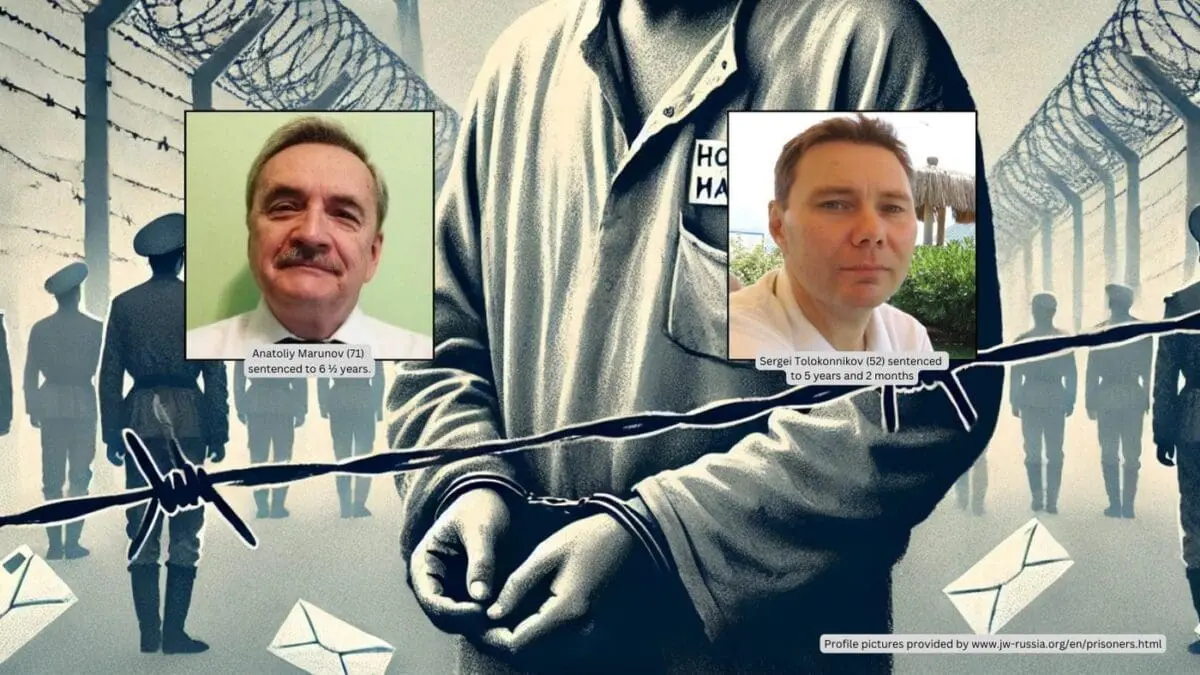On 25 October, 46-year-old Jehovah’s Witness Roman Mareev was released after having served his prison term but many others are still behind barbed wires: 147 according to the database of religious prisoners of Human Rights Without Frontiers in Brussels.
In Russia, to be a Jehovah’s Witness is a worse crime than to kidnap or to rape. In comparison
- According to Article 111 Part 1 of the Russian Federation’s Criminal Code, grievous bodily harm draws a maximum of 8 years sentence.
- According to Article 126 Part 1 of the Criminal Code, kidnapping leads to up to 5 years in prison.
- According to Article 131 Part 1 of the Criminal Code, rape is punishable with 3 to 6 years in prison.
Anatoliy Marunov and Sergei Tolokonnikov sentenced to 6 ½ years and 5.2 years
In July 2023, the Savelovsky District Court of Moscow sentenced Mareev to 4.5 years in a general regime colony. He was found guilty of involvement in the activities of a banned organization (p. 1.1 Art. 282.2 of the Criminal Code).
Mareev was arrested in October 2021. He spent a little more than three years, or 1100 days, in three Moscow detention centers. Since one day in custody is equivalent to one and a half days in a general regime colony, Mareev’s term was considered served.
For some time the believer did not have his own bed in the cell and he slept on the floor. Mareev said that in the detention center he was supported by letters from family, friends and strangers. In three years, he received letters from 68 countries.
Two other believers who were convicted together with Mareev remain in prison – Anatoliy Marunov and Sergei Tolokonnikov. The first one was sentenced to six and a half years in a general regime colony, and the second one to five years. In the appeal, Tolokonnikov’s term was increased to five years and two months.
They did not plead guilty, and one of the lawyers emphasized that they were persecuted only for their religion.
The usual charges for Jehovah’s Witnessesr are the spread of their religious beliefs and participation in religious services.
A native Muscovite Sergey Tolokonnikov worked for many years as a security guard. After becoming a Jehovah’s Witness, he refused to carry weapons and to use violence against others. Despite this, in October 2021, the authorities considered him a dangerous criminal, charging him under two extremist articles for his faith.
Anatoliy Marunov worked for almost 40 years in the publishing house and printing house of the “Krasnaya Zvezda” newspaper, which for a long time was the central printed organ of the USSR and Russian Federation Ministry of Defense. He joined the movement of Jehovah’s Witnesses at the end of the 1990s.
Jehovah’s Witnesses banned since 2017
In 2017, the Supreme Court recognized the “Jehovah’s Witnesses Management Center in Russia” as an “extremist organization”, liquidated it and banned its activities on the territory of Russia. All Jehovah’s Witnesses organizations were included in the banned list, after which the flow of criminal cases against believers began.
Rosfinmonitoring included hundreds of Russian followers of Jehovah’s Witnesses in the list of “extremists and terrorists”. Most of the people on the list are believers aged 40 to 60.
On 7 June 2022, the European Court of Human Rights declared the ban of Jehovah’s Witnesses organizations and the subsequent persecution of believers illegal.
From the point of view of the ECHR, the decision to liquidate the organization and criminal cases against Jehovah’s Witnesses is based on too broad a definition of “extremism”, which in Russian legislation “can be applied to absolutely peaceful forms of expression”.







